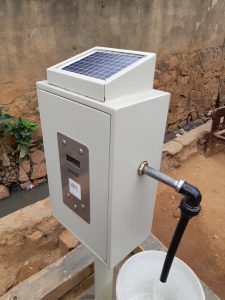As COP27 negotiations continue and as recent climate-related disasters have shown the world the urgent need to act, Aqua for All would like to highlight some of its recent work to support water and sanitation enterprises become climate smart.
Climate change is not a new topic and Aqua for All has supported enterprises that develop climate smart water and sanitation interventions, throughout its programmes. We are currently taking the next step by developing a climate strategy to incorporate climate considerations in all aspects of our work, from our own operations to the enterprises and initiatives that we support.
In August 2022, Aqua for All conducted a survey on climate change impacts among its partners to ensure that our climate strategy takes into account the realities faced by water and sanitation enterprises. With the survey, we gained understanding of the day-to-day effects that climate change is already having on water and sanitation enterprises, and fears of probable future impacts on communities and the services that our partners provide. Using the survey results, desk research and expert consultations, Aqua for All will strengthen its instruments for climate adaptation and mitigation to help lower the effects of climate change on water and sanitation enterprises and their surrounding communities.
Direct impact of climate change on drinking water supply and sanitation enterprises
Aqua for All acknowledges that climate change leads to acute and chronic changes in weather patterns. This has direct consequences on water availability and its quality. The focus of the partner survey was therefore on understanding the effects of climate change on established water and sanitation systems of the countries and communities that we operate in.
The findings stemmed from 26 water and sanitation enterprises, located in both urban and rural areas in 13 different countries: six countries (14 organisations) in Africa, six countries (11 organisations) in Asia and one in Latin America. We found that:
- Most enterprises are already detecting changes in their local and regional climate, namely flooding, droughts, extreme heat, and declining groundwater levels.
- Consequently, the majority of people in surrounding communities are fearful of droughts, surface water pollution and groundwater reduction. According to IPCC model projections[1], an increase of heavy precipitation events will very likely occur globally over the next decades, leading to increased flooding.
- Overall, respondents were asked to rate the level of threat posed by climate change on their abilities to carry out operations of their WASH enterprises in comparison to other threats, on a scale of 1 to 100. The result was an average of 63. This indicated that the anticipated effects of climate change on the operations of water and sanitation enterprises is considerable.
The findings of the survey further provided valuable ideas on mitigation and adaptation activities that water and sanitation enterprises would want to implement to adjust their operations in a climate smart manner. Moreover, the results revealed that enterprises require financial and technical support to implement these activities and enable their operations and surrounding environment to adapt to the effects of climate change.
Moving forward: Accelerated implementation of sound climate frameworks

Recognising the impact of the WASH sector on GHG emissions as well as the dire need to adjust to climate change impacts, Aqua for All has established a two-fold climate strategy: Looking at mitigating greenhouse gas emissions as well as adapting water and sanitation operations to climate changes.
Our mitigation strategy focuses on practical steps to reduce CO2 and methane emissions. Currently, the WASH sector’s GHG emissions are significant, estimated to be 3-7% of the global total of GHG emissions[2]. Therefore, Aqua for All will seek to motivate water and sanitation enterprises to switch to using renewable energy for their operations, increase efficiencies and reduce leakages. In many of the countries where Aqua for All operates in, the introduction of safe drinking water removes the prerequisite to boil water, thereby intrinsically reducing local deforestation and further avoiding emissions of GHGs. In the case of sanitation enterprises, we will put additional focus on avoiding unabated emissions of methane that originate from anaerobic digestion of human waste.
Our adaptation strategy focuses on practical steps to adapt WASH enterprises’ operations to be resilient to the impacts of climate changes. As climate change impacts will materialise differently in every part of the world, the first step will be to understand the climate hazards at the location of operations. Aqua for All is therefore developing a climate risk assessment framework for water and sanitation enterprises comprising the identification and calculation of the risk to their operations and local communities.
Depending on the identified risks, targeted activities or measures to reduce vulnerability to these climate risks can be developed. Aqua for All aims to support enterprises in implementing these.
Metrics will be developed to measure the level of success of the chosen mitigation and/or adaptation activities. This will help to demonstrate annual progress and to set targets related to the baseline to increase the amount of support for climate smart initiatives, and increase the resilience of supported enterprises to the impacts of climate change.
Wherever possible, Aqua for All seeks to support projects that maximise the synergies between mitigation and resilience. This aids in contributing to low carbon emissions, climate resilient development; the only way for sustainable water and sanitation services for all.
Let’s hope that the world leaders at COP27 will use the event as a vital opportunity to support the countries that are behind target for SDG 6 (universal access to water & sanitation), so that the necessary financing and enabling environment will be available for climate smart water and sanitation enterprises to thrive.
[1] Douville et al., 2021: Water Cycle Changes. In Climate Change 2021: The Physical Science Basis. Contribution of Working Group I to the Sixth Assessment Report of the IPCC. Cambridge University Press, Cambridge, United Kingdom and New York, NY, USA, pp. 1055–1210, doi:10.1017/9781009157896.010.
[2] UN World Water Development Report, 2020